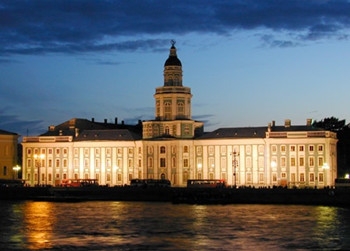
8.Spotlight on St. Petersburg
8 聚焦圣彼得堡
St. Petersburg. The very name brings to mind some of Russia's greatest poets, writers and composers: Pushkin, Dostoevsky, Tchaikovsky. The 19th century was a golden age for St. Petersburg's wealthy classes. It was a world of ballets and balls, of art and literature, of tea and caviar.
一提到圣比得堡,我們就想起許多偉大的俄國詩人,作家,作曲家,例如:普希金,杜斯妥也夫斯基,柴可夫斯基。19世紀是圣比得堡富有階層的黃金時代。充斥著那個世界的是:芭蕾與舞會,文學和藝術以及茶葉和魚子醬。
The golden age ended with the advent of World War 1. Working people were growing more and more discontented. In 1917, Communism came, promising peace and prosperity.
黃金時代伴隨著一戰的爆發而結束。勞動人民的不滿情緒愈發強烈。在1917年,共產主義到來,并承諾帶來和平與繁榮。
St. Petersburg had become Petrograd in 1914. People wanted a Russian name for their city. Ten years later, the city's name changed again, this time to Leningrad. Then in 1991, Leningraders voted to restore the city's original name. Some people opposed the name change altogether. Others thought it was just too soon. Old, run-down Soviet Leningrad, they said, was not the St. Petersburg of 19th-century literature.
圣彼得堡于1914年更名為彼得格勒。人民想要用俄文為他們的城市命名。十年后,彼得格勒再次更名——列寧格勒。在1991年,列寧格勒市民想通過選舉恢復這座城市最早的名字。一些人完全反對變革城市的名字。另一些人認為名字更改的過快。他們認為,蘇維埃列寧格勒年邁而破舊,它已然不再是19世紀文學作品里的圣彼得堡。
What, then, is St. Petersburg? In the confusing post-Communist world, no one really knows. The quiet, if Soviet-style, dignity is gone. The Communist sayings are down, and gaudy advertising up. Candy bars and cigarettes are sold from boxy, tasteless kiosks. And clothing? Well, anything goes. Everyone wants to be a little different. But many people do not know the true meaning of freedom. Personal crime has gone up, up, up in the past few years.
那什么才是圣彼得堡呢?共產主義后期的世界中充斥著迷惑,真相無人知曉。蘇聯模式下的寧靜與尊嚴已經蕩然無存。看不見了共產主義的標語,浮夸的廣告卻四處張貼。庸俗的四方形報亭販賣著糖塊與香煙。至于服裝?也是無所不有。每個人都想有所改變。但是很多人并不明白何為真正的自由。個人犯罪案例在過去幾年也是居高不下。











